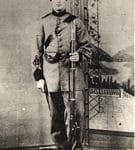“Form! form! Riflemen form!”
During the French Revolutionary & Napoleonic Wars a thriving Volunteer movement had grown up, whereby tens of thousands of men were equipped and trained as part-time soldiers, ready to defend the United Kingdom from French invasion. As the invasion threat subsided during the course of the wars, the Volunteer companies were disbanded or converted to Local Militia, which in their turn faded away when Napoleon had been defeated.
In the late 1850’s a new French threat was perceived and one Captain John Evat Acklom, late of Her Majesty’s 28th North Gloucestershire Regiment, has a good claim to being the originator of a new Volunteer movement, one which has continued to exist, through many changes, up to the present day.
In December 1858 Acklom wrote a letter to The Times, entitled “Ready! or England for ever safe from the Invaders” and bombarded Parliament, the War Office and numerous people of influence with his proposals concerning the formation of a Volunteer Rifle Corps. Popularised by Prince Albert and the Poet Laureate, Volunteer fever swept the country.
“THERE is a sound of thunder afar,
Storm in the south that darkens the day,
Storm of battle and thunder of war,
Well, if it do not roll our way.
Form! form! Riflemen form!
Ready, be ready to meet the storm!
Riflemen, riflemen, riflemen form!”
Alfred Lord Tennyson, “The War” 1859.
The County of Gloucestershire was not slow in responding to the call and independent Volunteer Rifle Companies sprang up everywhere. The links with the county regiments were swiftly established and, in response to an enquiry from the Colonel of the 28th, then in Bombay, the War Office informed him in a letter of 12th July 1859 that a force of Bristol Rifle Volunteers was to be formed, not less than 500 strong.
The Volunteers were equipped and dressed as riflemen, at first in grey with green facings, and then, for the Gloucestershire Rifle Volunteers, in green with scarlet facings. The Gloucester Docks Rifle Volunteers, founded in July 1859, saw themselves as a club, as their manifesto states:-
“This Club is formed on Patriotic principles for the purpose of acquiring skill in the use of the Rifle, which, we consider, should be National and habitual, that we may be prepared in the event of an Invasion to defend our Country, and on such an occasion, we pledge ourselves to immediately enrol under the Government for this purpose, and to obey the Commands of the Authorities, taking an oath of allegiance to the Queen if required.”
The Rifle Volunteer Companies of Gloucestershire – men from Bristol and its environs, Gloucester, Cheltenham, Stroud, Tewkesbury, the Forest of Dean, Dursley, Stow-on-the-Wold, Moreton-in-the-Marsh – were later organized into two battalions, the 1st Gloucestershire (City of Bristol) Rifle Volunteers and the 2nd Gloucestershire Rifle Volunteers. The time was yet to come when, first as men from Volunteer Battalions, then as Territorial battalions of the Gloucestershire Regiment, the part-time Volunteers of the county would provide sterling service abroad for their country in the Second Boer War and the two World Wars of the twentieth century.
Picture: Gloucestershire Rifle Volunteer, c. 1860.


